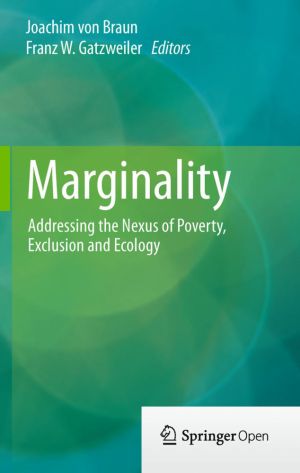Marginality
Addressing the Nexus of Poverty, Exclusion and Ecology
by Joachim von Braun, Franz W. Gatzweiler
DescriptionDetailsHashtagsReport an issue 



Book Description
This volume presents new insights on marginality, i.e. the situation of people living on the edge of socio-economic and ecological systems. The marginality concept leads to different development policies. While the prevalence of poverty declined by about 50 percent in the past two decades, any further reduction of poverty will be more difficult, because of high diversity of extremely poor people, and complex interrelations between poverty, exclusion and ecology. The marginality concept provides guidance to address this issue. Marginality entails addressing the structural forces of poverty, such as exclusion, discrimination and ecological degradations which lead to vulnerability of the poor. In this volume economists, ecology experts, geographers, agronomists, sociologist, and business experts come together to address marginality. The inter-disciplinary research offers conceptual innovations and presents the dimensions of marginality in developing countries. Economic, political, and environmental drivers are assessed and mapped globally and in detail for countries in Africa and Asia, especially Ethiopia, India, Bangladesh, China, Indonesia. Economic growth especially in rural areas remains and farming communities is central to poverty reduction but needs to be complemented with specific actions to reach those at the margins. The social policy actions and measures to end exclusions are highlighted, and the roles of the state, local government, business and community in them are pointed out for overcoming marginality.This open book is licensed under a Creative Commons License (CC BY-NC). You can download Marginality ebook for free in PDF format (5.9 MB).
Book Details
Title
Marginality
Publisher
Springer
Published
2014
Pages
388
Edition
1
Language
English
ISBN13
9789400770607
ISBN10
940077060X
ISBN13 Digital
9789400770614
ISBN10 Digital
9400770618
PDF Size
5.9 MB
License

Related Books

This book investigates psychiatry in Uganda during the years of decolonisation. It examines the challenges facing a new generation of psychiatrists as they took over responsibility for psychiatry at the end of empire, and explores the ways psychiatric practices were tied to shifting political and development priorities, periods of instability, and ...

The aim of the book is to present contributions in theory, policy and practice to the science and policy of sustainable intensification by means of technological and institutional innovations in agriculture. The research insights re from Sub-Saharan Africa and South Asia. The purpose of this book is to be a reference for students, scholars and prac...

Historians often assume a one-directional transmission of knowledge and ideas, leading to the establishment of spatial hierarchies defined as centres and peripheries. In recent decades, transnational and global history have contributed to a more inclusive understanding of intellectual and cultural exchanges that profoundly challenged the ways in wh...

